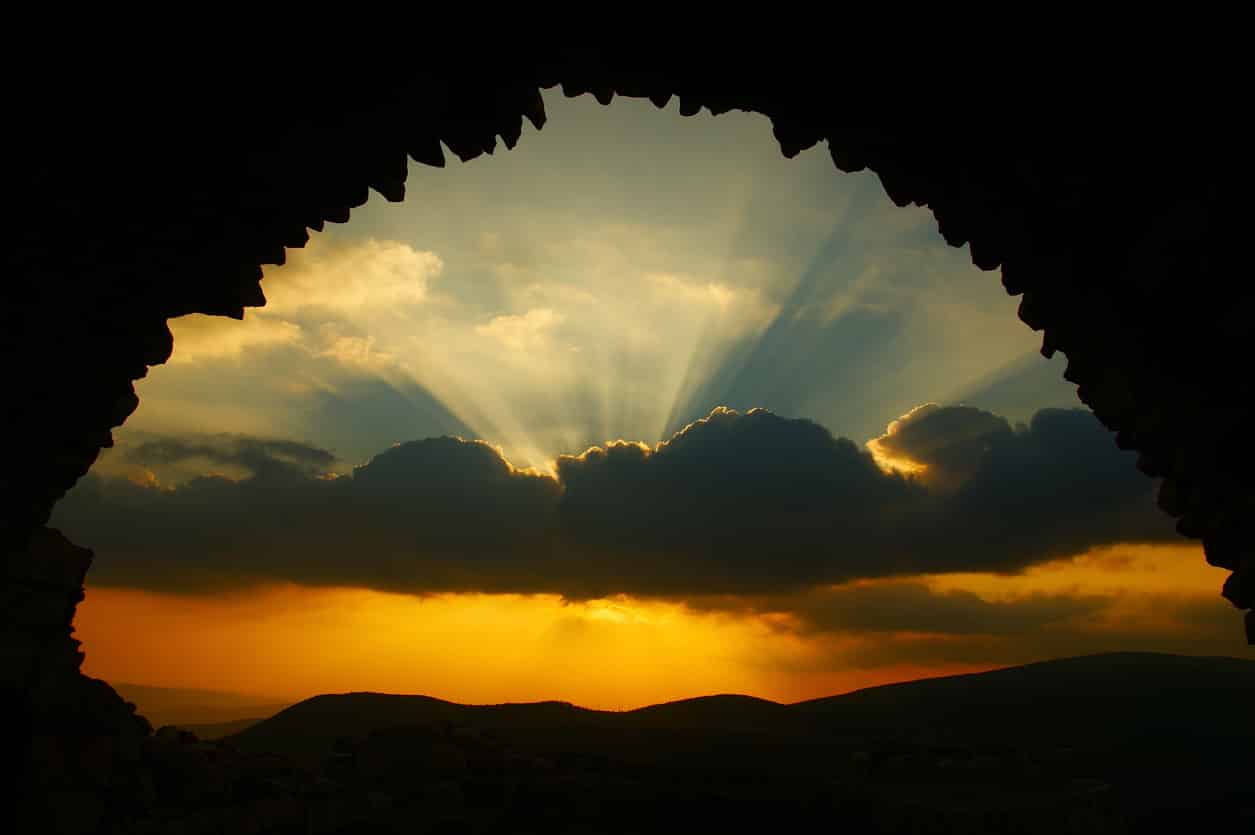The single most important event in history took place 3316 years ago.
Sinai set in motion a series of events that would change the world forever, and continues to impact our lives today.
At Sinai the human race received a Divine blueprint how to live our lives. This great gift was given for all of mankind, however at the time the nations of the world rejected it. As our sages tell us that the children of Esau and the children of Ishmael both were offered the Torah and they rejected it after seeing that they could not live up to its laws, namely the prohibition on murder, theft and sexual transgressions.
It would take over 1000 years for the children of Esau – the Roman/Western/Christian world – to begin embracing the Sinai principles. It would take another 700 years for the children of Ishmael – the Muslim/Arab world – to do the same.
Yet, even after the birth of Christianity and Islam both would struggle with these principles and wreak global havoc in the process. For centuries Christians terrorized the world in the name of their religion. The Crusades, the Inquisitions, the pogroms are a few examples of the awful horror the Christians inflicted in their search to eradicate so-called heresy. Only in the last few hundred years has Christianity been tamed.
Islam too has had periods of aggression, now rearing its ugly head and terrorizing the world.
The bottom line is that the children of Ishmael are still struggling with the message given at Sinai.
What was it at Sinai that the children of Esau and Ishmael rejected, and what is its message today that they need to embrace?
At Sinai the world changed. For the first time the human race was given the opportunity to bridge heaven and earth – to fuse spirit and matter. Until that point there existed an invisible wall between the transcendental and the material. A decree, a schism separated between above and below. “That which was above could not descend below, and that which was below could not ascend above.”
Sinai opened a door, never again to be closed, that allows mortals in a material world to become Divine. It gave us the power to spiritualize the material, and to make our lives sacred, not just ethical.
This was no small event.
Philosophers, thinkers, theologians and lay people have all always asked the eternal question: How high can a human being reach? Are we humans just sophisticated beasts, with limited potential? Can we ever reach heaven and beyond or bring heaven down to earth? Can we integrate spirituality into our material lives? Can we fuse the finite and the infinite?
The fact is that matter and spirit are in a perpetual struggle. Narcissism, greed, corruption are staples of life. When we look at ourselves each of us knows that we often feel that “I exist and nothing else” (“ani v’afsi oid”), to the detriment of others. When this feeling becomes extreme it can destroy lives of those around us.
On the other hand, we also have a spirit inside of us. We have the power to live noble lives, filled with dignity and selflessness.
So we have an inevitable clash. Matter by its very nature is selfish. Spirit is selfless. No wonder that people have always speculated whether these two worlds can meet, let alone merge.
In general we find two approaches evolving in history: Asceticism and immersion. One states that in order to experience spirit we must separate ourselves from the material tentacles of life, and “climb the mountain” to meditate and become absorbed in a higher reality. Basically, one must deny the material life. An extreme version of this would be the ascetic life. To achieve the sacred the material life must be compromised. The infinite may be reached, but only by denying the finite.
The other extreme is that we cannot really reach heaven. We must live ethically, build healthy homes and workplaces, and find spirit in limited ways within our limited lives. Because we are essentially mortal creatures, with inherent selfishness or even evil, we cannot expect anything more than the best an earthy creature can achieve. A variation of this includes the ability of achieving salvation but not through our own efforts but by embracing something beyond us. The infinite is not integrated into our own personal lives.
Sinai opened the door of a third option. Sinai created an interface that bridged heaven and earth, giving us the power to integrate matter and spirit, utterly and completely, without compromising one or the other. The finite can become one with the infinite; matter one with spirit; the sacred one with the secular. Briefly, because G-d is neither spirit nor matter, He gave us the power to completely integrate the two.
This third option, however, does not come easily. As limiting as the first two options may be, they seem simpler, while the Sinai option requires a continual straddling of the thin line between matter and spirit.
That is why Sinai did not come easily. The nations of the world could not accept – nor understand – how one can bridge the two worlds. They therefore rejected the Torah at the time. Even the Jewish people did not reach Sinai effortlessly. Twenty-six generations of hard work, culminating with the terrible Egyptian slavery, was necessary before the people would be ready for Sinai.
This struggle between heaven and earth has many manifestations, including the battle that we so often have witnessed between religion and secularism. If you are a firm believer how do you deal with the secular world? According to the two-abovementioned options you either have to wage a holy war against the secular, or your basically embrace the secular with limited sanctity.
Therein lies the essential root of the religious wars waged throughout history. Recognizing secular heresy as an enemy, the Christians and later the Muslims, engaged in aggressive battles with the forces they perceive as threatening.
These battles actually began in the home of Abraham. Abraham, father of all nations, was the one that began the process, which was consummated at Sinai, of discovering and embracing the method of integrating the Divine and the mundane. Yet this effort encountered many challenges, including the difficulties with his son Ishmael. “He [Ishmael] will be a wild man. His hand will be against everyone, and everyone’s hand will be against him” (Genesis 16:12). It came to a point that Ishmael had to be banished from Abraham’s home.
This battle only intensified in the home of Isaac, son of Abraham, in the struggle between the twin brothers, Esau and Jacob. “Two nations are in your womb. Two governments will separate from inside you. The upper hand will go from one nation to the other. The greater one will serve the younger.” The brothers are diametrically different characters. Esau is a “skilled hunter, a man of the field.” “Jacob was a wholesome man, who sat in the tents” – a scholar who dwelled in the tents of study.
The battle between Esau and Jacob represents the battle between the material and the spiritual, a struggle that would only be resolved at the end of times.
What was the core of Ishmael and Esau’s difficulties, one that would later cause their children to reject the Torah, while the children of Jacob were embracing it?
Chassidic texts explain that the problem was rooted in balance. Ishmael (son of Abraham) was an archetype of abundant chesed (love) without the discipline of gevurah (judgment and discretion). Esau (son of Isaac) was an extreme of gevurah without the sensitivity of chesed.
Jacob, by contrast, was tiferet. Tiferet is beauty – harmony within diversity. Tiferet has the power to fuse love and discipline into one symmetrical unit. Tiferet possesses this power by introducing a third dimension – the dimension of truth, which is neither love nor discipline and therefore can integrate the two. Truth is accessed through selflessness: rising above your ego and your predispositions, enabling you to realize truth. Truth gives you a clear and objective picture of yours and others’ needs.
Jacobs’ children were educated with this Tiferet balance. They thus were ready for Mattan Torah, to receive the Torah at Sinai, which is called Tiferet. This is why we don’t find the Jewish people embarking on any religious war against heretics, or converting the nations of the world to Judaism. Conversion is actually dissuaded in Jewish law. When you are a person of Tiferet – secure in your own beliefs; aware that all humans were created in the Divine image, and one need not be Jewish to serve G-d; maintain a perfect equilibrium between love and discipline; absolutely confident that the sacred and the secular can be integrated with the Divine, and that this integration will come to fruition; lacking any fear that evil may be more powerful than good – then you can maintain the highest standard of spiritual integrity without resorting to killing or terrorizing others to conform to your beliefs.
Ishmael and Esau lacked this balance. Unbridled love and untempered discipline, even if they are driven for a good cause, ultimately become aggressive forces of destruction. Too much undisciplined love spoils a child and can create a monster, like too much rain that floods and destroys the fields. Unlimited judgment and severity, without underlying love, becomes tyrannical.
Thus, at Sinai the children of Ishmael and Esau were not yet prepared to receive the Torah. But their time would come, and come it did. Maimonides writes that by the mysterious ways of Divine Providence, Christianity and Islam helped pave the way for the Messianic age by acquainting the world with the principle of Messiah, the Torah and mitzvot. As time would pass their beliefs would continue to refine and mature.
In the centuries that followed Esau and Ishmael’s descendants would go through their growing pains in learning how to balance religious beliefs and daily life. This would not be an easy process; history is witness to the devastation and bloodshed wreaked by this journey. But slowly, slowly, Sinai would seep into the fibers of all people. The process concludes with the refinement of the last two powers, Edom (Esau) and Ishmael, which leads to the Messianic age – a world where there is no more destruction and terror and all children of Abraham serve the One G-d of Abraham in peace and harmony.
After years of tyranny the Western/Christian world has finally bred countries like America that champion the fundamental principles of Sinai: All people are created equal with inalienable rights and freedoms. The children of Esau have come to embrace the teachings of Abraham, formalized at Sinai.
The time has come for the children of Ishmael to do the same. We need to look at the education system, the curricula that Muslim children are being taught, and analyze it with the same rigor that we do in the media with far more superficial issues.
I understand the risk of interfering in the sovereignty of another country’s education system. Yet, we must approach this with pure intentions, infused with humility, demanding of ourselves the same standards we expect of others. Then we have a right to demand of ourselves and others to live up to the standards that Abraham taught all his children and all of civilization.
America today plays a special role in this work. The foundations of this country are built on absolute principles of faith and trust in G-d. This is not just a country of economic opportunity. The success of corporate America and unprecedented prosperity is a result of an unwavering mission statement: All equal, in G-d we trust, diversity and individual, e pluribus unum — under one G-d.
This country must align itself with its mission – the business of this nation must reconnect to its higher calling. Then and only then does this country earn the right to hold itself up as an example to the world. Simply being a nation of great wealth and power does not by any means give it the moral high ground. Other nations, religions and peoples have much longer traditions and histories than the relatively new world of America. But America can demonstrate something unique to the world. As a country, it can rise above our own national issues and serve as a beacon of light teaching the world the universal principles of all humankind – the principle upon which this nation was founded – how to live in peace with G-d.
3316 years ago the children of Esau and Ishmael rejected the Torah. Perhaps G-d could not impose it on them. But we can.
Today we must call on them, and insist, that they finally accept what they rejected then – that they finally accept the Torah in its entirety.
After all we have endured in the last three millennia, and with the current state of atrocity in the Middle East, we can appreciate the need for all nations to embrace the mandate given to us at Sinai.
So, 3316 years later how far are we from Sinai? On one hand it seems quite far, but on the other Sinai may be just around the corner. It’s up to us to determine which one it will be.
Is there a more powerful challenge to us as we approach Sinai?
This is the call of the hour. The call of Sinai. The call that sounded 3316 years ago and resonated around the globe and throughout history. This call is still reverberating today, waiting for our response.







